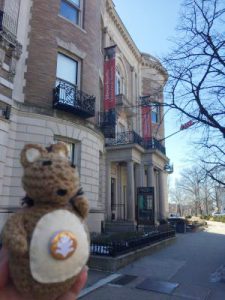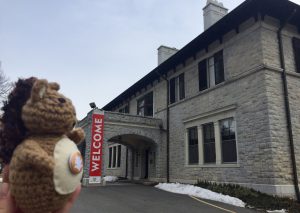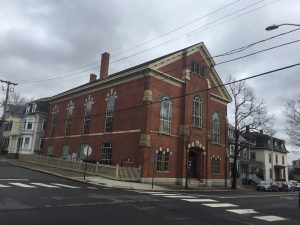Sometimes we need to follow, quite literally, the paper trail when we want to learn more about a particular family group. Even in this digital age, not everything can be accessed from a computer. Perhaps the key to the story can be found in manuscripts kept safe in historical societies, archives, and libraries. This new series of blog posts—Following the Paper Trail—will provide guides for visiting each state historical society (or equivalent), region by region, across the eastern United States.
Early in 2019, I took a three-month research journey with my squirrel pal, Ann Cestor. She mainly served as a model to complement the lovely (and sometimes more-functional-than-lovely) exteriors of each location. I focused on the usefulness of the contents inside. Getting from the outside to actually getting my hands on materials meant following a different set of procedures for each institution. Understanding the requirements and feeling prepared took some effort. With this series, the intention is to share what I learned about visiting each location in order to help other researchers feel more comfortable and make visits as worthwhile as possible.
We start the journey close to home, with the three New England states of Massachusetts, Connecticut, and Rhode Island.
Massachusetts Historical Society
https://www.masshist.org
1154 Boylston Street, Boston, Mass.
Open Mon., Wed., Thurs. & Fri., 9:00 a.m.–4:45 p.m.; Tues., 9:00 a.m.–7:45 p.m.; Sat., 9:00 a.m.–4:00 p.m.
Free and open to the public.
Prep Tips:
- Search the online catalog ABIGAIL. Try searching/browsing by subject including population groups (like Indians of North America) and location (like Boston [Mass.]).
- Search Collection Guides (like “Collections relevant to African American history at the Massachusetts Historical Society: An Overview”) at https://www.masshist.org/collection-guides/.
- Book set by the reference desk lists manuscripts at MHS that are mostly alphabetized by surname but also includes group names (like Iroquois).
- Reference desk room also has five shelves of unpublished finding aids (including lists of diaries organized by years).
- Request items to view via Portal1791. The catalog or collection guide will feature an option to Place Request or Request Items. Items stored offsite must be requested at least two days prior to visit. Indicate date of intended visit in Portal1791 as you request each item.
- Email library@masshist.org with questions and a reference staff member will at least provide some basic information beforehand and then be better able to assist upon arrival.
Registration Process:
- Use online registration at Portal1791 to obtain a personal account login.
- Security buzzes open the front door. Go to security desk to sign in and receive a printed ID badge.
- Bring badge to the orientation room on the right (when facing security) to check in. Reception needs a photo ID to complete the registration and takes a photo. The ID badge on a lanyard must be worn during visit.
- Put everything but electronics, cords, and badge in a locker, and hold on to the key.
- First time visitors go down the hallway to the right to receive an orientation at the reference desk.
- Cross the hallway to the Reading Room.
Requesting Items:
- Order up to 25 items via the online catalog, Portal 1791. Progress of requests can be tracked via catalog. Ordering can be done offsite before arrival or onsite.
- Usually 5 items are pulled at the time of your arrival so anticipate a short wait.
- Attendant asks for preferred retrieval order.
- Attendant brings the item to the desk.
- When finished with each item, the attendant checks it back in.
FYI:
- Photos allowed.
- Wi-Fi available.
- Have all notes in electronic form. Notebooks, folders, and loose paper are not allowed. MHS provides colored paper for taking notes onsite.
- MHS has digitized some of their most popular collections (including the Adams Papers) at http://www.masshist.org/collections/online.
- They usually offer interesting lectures through their Brown-bag Lunch Program.
Connecticut Historical Society
https://chs.org
One Elizabeth Street, Hartford, Conn.
Open Tues.–Thurs., 12–5 p.m.; Fri.–Sat., 9 a.m.–5 p.m.
Free to members; $12 adults; $10 seniors.
Prep Tips:
- Search online catalog HistoryCat.
- Manuscript Finding Aids available at https://chs.org/finding_aides/finding_aids/mss_find.html.
- Email research_center@chs.org (or call 860-236-5621, ext. 228) to obtain a login for HistoryCat. Request items through HistoryCat by clicking on Place Request. In the Request Notes box, add notes about the specific boxes you wish to view and the dates you wish to visit.
- Email queries in advance for some great suggestions. Onsite staff is also extremely helpful.
Registration Process:
- Sign in (and pay fee) at reception desk at the front entrance.
- Behind the reception desk to the left (just outside of the research room), put everything but electronics, cords, pencils, loose paper, and photo ID in a locker, and hold on to the key.
- In the research room, show photo ID and fill out a short registration card. This may have to be done each year.
Requesting Items:
- Items requested via the online catalog HistoryCat will be pulled in advance.
- Request items via HistoryCat at the Research Center and let staff know about the request(s). They retrieve items quite quickly.
FYI:
- Photos allowed.
- Wi-Fi available with password.
- Exhibits throughout this historic house are worth scheduling some browsing time.
Rhode Island Historical Society
https://www.rihs.org
121 Hope Street, Providence, R.I.
Open Wed.–Fri., 10 a.m.–5 p.m.; 2nd Sat. of the month, 10 a.m.–5 p.m.
Free to members and Rhode Island residents; $8 non-residents; $5 students and seniors (over 65).
Prep Tips:
- Search online catalog NETOP. If relevant, reference staff recommends searching by
countries of origins, which often are used in descriptions and/or subject headings.
- See the Master List of Finding Aids. For example, “A Guide to Women’s Diaries” lists by names, dates, locations, and ages. Notes about diversity and class as well as a list of “Curator’s Favorites” follows. The guide to men’s diaries has not yet been posted to the website, but the staff has access and can search by keyword.
- In the Reading Room, check the card catalogs (in separate cases for manuscripts and oral histories) and finding aids (in black binders alphabetized by surname). Only about 40–50% of the collection has been added to the online catalog.
- Email reference@rihs.org with queries. An automated response indicates the message has been received. (A reference staff member responded to my query the following day.)
Registration Process:
- Registration form can be printed and filled out in advance.
- Present photo ID to complete registration at reference desk upon arrival and sign visitor’s log.
- To left of front door before entering the Reading Room, put everything but electronics, cords, pencils, loose paper, and photo ID in a locker. A sign on top of the lockers provides instructions for setting a four-digit combination lock. Make note of locker number and the four numbers selected to unlock later.
Requesting Items:
- Fill out call slips onsite to request manuscripts. Only three call slips can be submitted for each and must be turned in a few minutes before each designated pull time. They only pull items at 10:30 a.m., 11:30 a.m., 2 p.m., 3 p.m., and 4 p.m. (books only).
- Be advised, depending on number of requests and staffing, it can take a while to receive the requested items.
- Staff will bring one item at a time to the table and retrieve each when finished.
- Book cradles and weights accessible to assist in using materials.
FYI:
- Photos allowed. RIHS provides an identification tag to place within the photograph frame.
- Wi-Fi network and password listed on signs at each table.
~
For general tips on visiting a repository, see the Vita Brevis post “Getting the most out of a library visit.” American Ancestors offers a guide “Using the NEHGS Library,” which provides clear tips for visiting. Most of the institutions listed in this series feature similar guidelines on their websites.
Share this:

About Kyle Hurst
Kyle, Genealogist of the Newbury Street Press, holds a B.A. in both history and anthropology from the University of Wisconsin in Madison and has a master’s certificate in Museum Studies from Tufts University. With experience at the National Archives and Record Administration in Waltham, Kyle has worked on a wide variety of research projects as part of the Research Services team at NEHGS and, with Newbury Street Press, has contributed to a number of family histories. She has been credited for her contributions to The Root, TheRoot.com, and she has also written for American Ancestors magazine.View all posts by Kyle Hurst →


